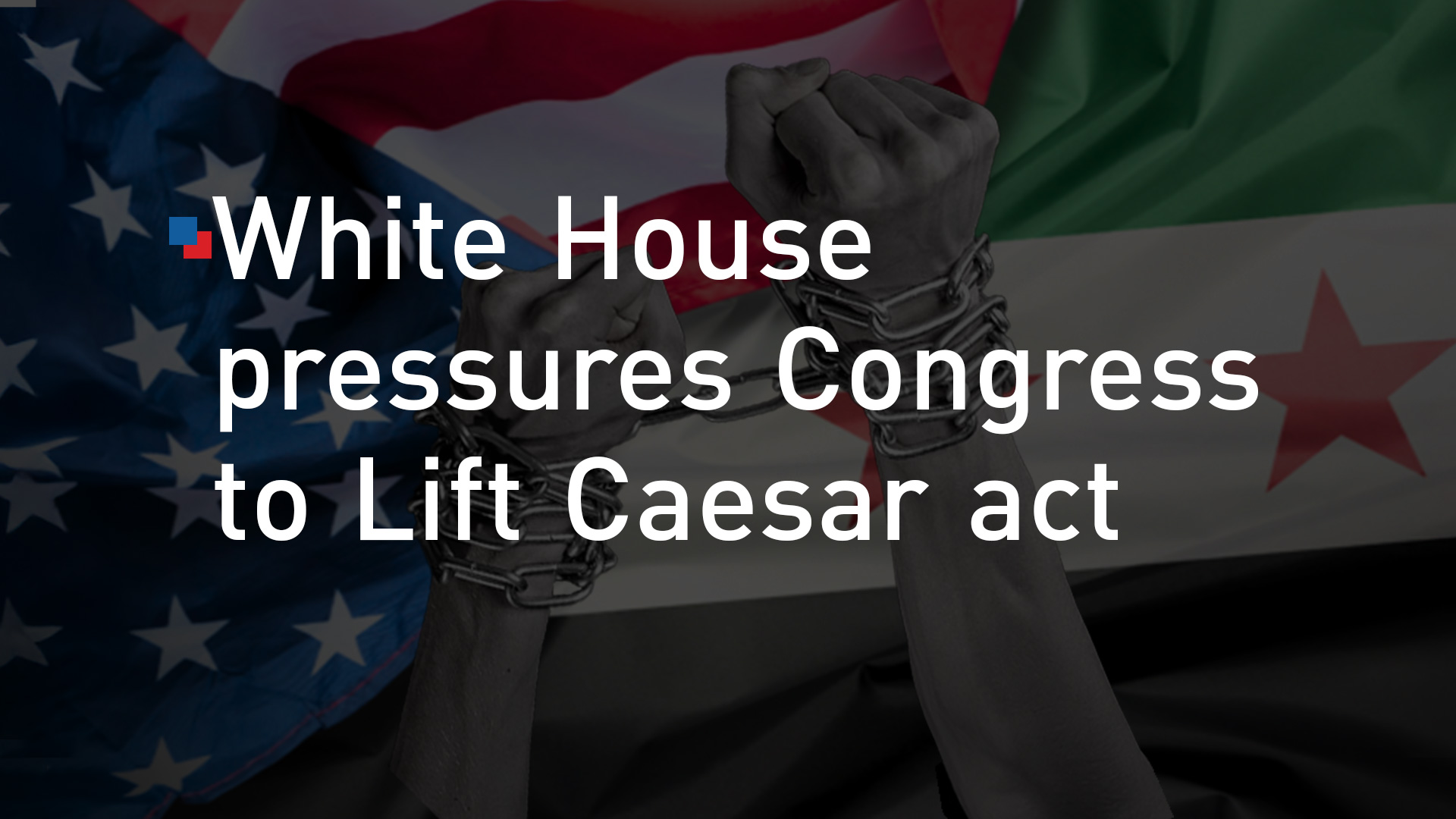The White House is pressuring Congress to Lift Sanctions on Syria
The White House is pressuring Congress to repeal the Caesar Act sanctions on Syria, arguing they hinder post-war reconstruction. While a growing bipartisan coalition supports lifting sanctions, pro-Israel groups and some lawmakers oppose the move, creating a legislative battle.

ERBIL (Kurdistan24) – According to a report by Al-Monitor, the White House is mounting an intense campaign to persuade Congress to repeal the Caesar Syria Civilian Protection Act, warning that continued enforcement of the sanctions could undermine Syria’s new post-war government and threaten the administration’s broader regional strategy.
Nearly a year after Ahmed al-Sharaa led the lightning insurgency that toppled the country’s repressive dictatorship, U.S. President Donald Trump has already rescinded most American sanctions through executive order, fulfilling his May pledge to give Syria and its newly formed leadership “a chance at greatness.” However, the most severe restrictions—those enacted under the 2019 Caesar Act—can only be repealed through congressional action.
Named for the Syrian military defector whose photos documented the Assad regime’s atrocities, the Caesar Act was designed to target individuals and entities supporting Syria’s military and state industries. Though the Trump administration has issued a 180-day waiver suspending the law, investors remain wary, fearing renewed penalties unless Congress permanently removes the sanctions.
In a lengthy statement posted on X, the administration’s Syria envoy Tom Barrack described the Caesar Act as a “sanctions regime that served its moral purpose” against Assad “but now suffocates a nation seeking to rebuild.” Barrack argued that a full repeal would unleash “one of the most consequential reconstruction efforts since post-war Europe.”
Behind closed doors, Al-Monitor reported that officials from the White House, State Department, and Treasury have “been very clear to Congress that the official position of the administration is full, clean repeal of Caesar.” According to a senior congressional aide, Barrack has also been personally lobbying key Republican lawmakers to support the repeal.
While momentum is building for lifting sanctions, divisions remain deep within Congress. In July, a House committee advanced a bill by Rep. Mike Lawler (R-N.Y.) that sought to conditionally waive the Caesar Act, requiring Damascus to make progress in fighting drug trafficking and protecting minorities. All Democratic members of the House Financial Services Committee—except Rep. Brad Sherman (D-Calif.)—voted against it, while Rep. Byron Donalds (R-Fla.) was the only Republican to oppose the measure.
Nevertheless, a growing bipartisan coalition is pushing for full repeal. Al-Monitor identified Sen. Jeanne Shaheen (D-N.H.), a senior member of the Senate Foreign Relations Committee, and Rep. Joe Wilson (R-S.C.) as leading figures in the effort. Even some of the Syrian American advocacy groups that once campaigned for the Caesar Act’s passage now back its removal.
“Everyone from Caesar himself to the families of those victims in the Caesar photos are calling for the Caesar Act to go,” said Mouaz Moustafa, executive director of the Syrian Emergency Task Force, in comments to Al-Monitor.
Despite growing calls for repeal, pro-Israel organizations in Washington are lobbying to preserve the sanctions, citing potential threats to Israel and minority groups such as the Alawites and Druze. Sources told Al-Monitor that senior Israeli officials—including Ron Dermer, a close aide to Prime Minister Benjamin Netanyahu—have been involved in direct outreach to U.S. lawmakers.
In the Senate-passed version of the annual National Defense Authorization Act (NDAA), Shaheen included an amendment that would repeal the Caesar Act. However, another amendment by Sen. Lindsey Graham (R-S.C.) mandates that the president certify every six months that the Syrian government refrains from military action against Israel and works to expel foreign fighters. If the president fails to certify compliance twice consecutively, it is “the sense of Congress” that Caesar sanctions should be reimposed—a nonbinding provision that has raised alarms inside the Trump administration.
“It’s counterproductive,” one senior official told Al-Monitor. “It will make companies and investors hesitate to do business with Syria. The country won’t get the full impact of sanctions relief.”
With the Senate’s passage of the NDAA earlier this month, negotiations with the House are now underway. House leadership has begun gauging support for including Caesar repeal in the final bill, which could be finalized as early as next week before being sent to President Trump for his signature by year’s end.
After 14 years of war, Syria’s infrastructure lies in ruins. Entire districts in Damascus and Aleppo remain devastated, with roads, hospitals, and power grids barely functioning. The World Bank estimates that full reconstruction will cost $216 billion—nearly ten times Syria’s GDP.
Facing insurmountable costs, a high-level Syrian delegation—including the finance and economy ministers and the central bank governor—recently met with U.S. officials in Washington to advocate for lifting sanctions and reducing the 41 percent tariff that currently applies to trade with Syria, one of the highest in the world.
The delegation’s appeals come as the Sharaa government struggles with a collapsing currency, rampant inflation, and a crippled banking system. If the repeal effort fails to make it into this year’s NDAA, Al-Monitor reported, Congress may have to wait until the next fiscal year to revisit the issue—an outcome many Syrians say they cannot afford.
“Sanctions are like a rope around our throats,” one Damascus business owner told Al-Monitor’s Amberin Zaman, capturing the despair of a population hoping for economic relief after years of destruction and isolation.